Have you ever wondered why tea drinkers always seem so calm? Only found in tea, l-theanine may be the best-kept secret behind tea drinkers' happiness.
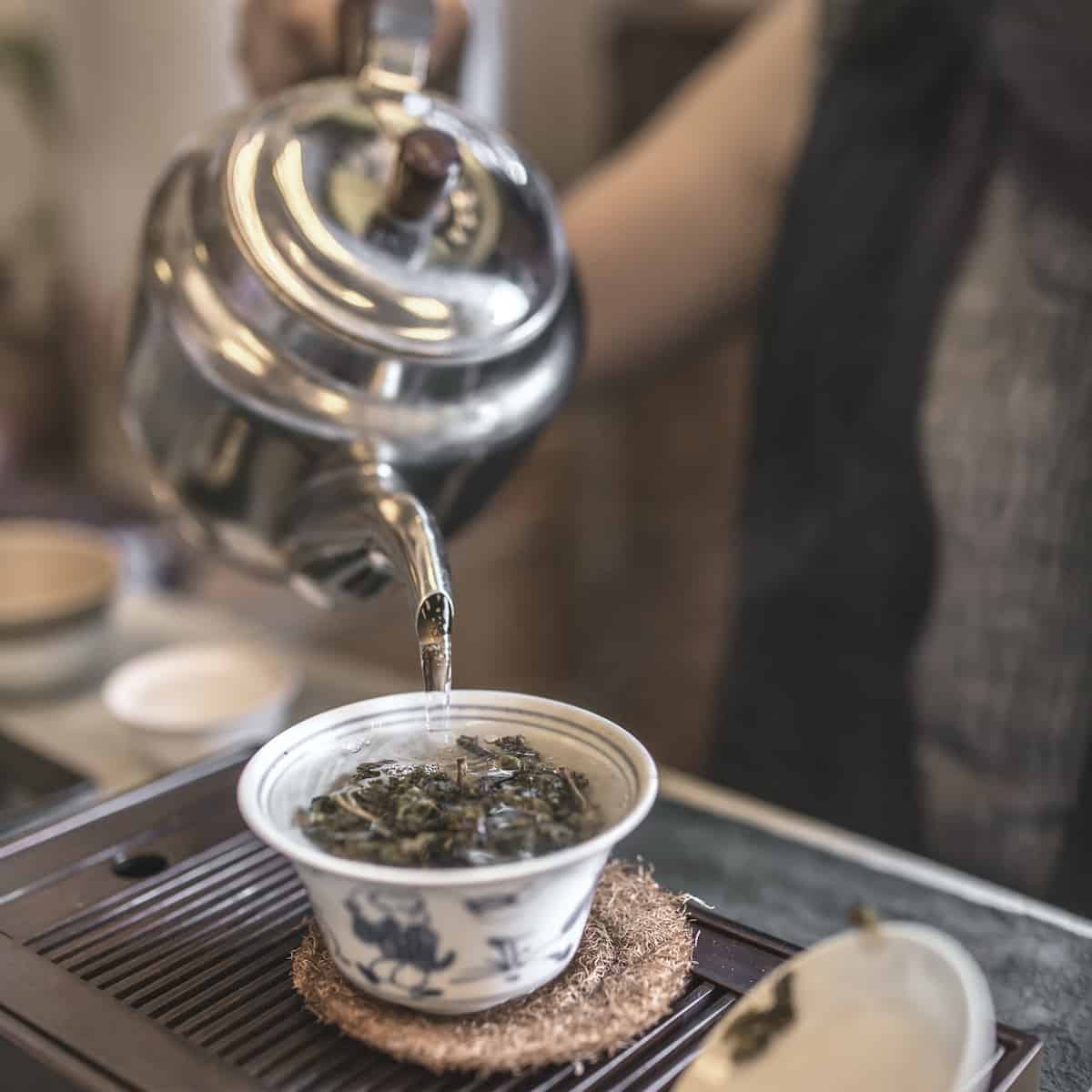
Can a cup of tea make you happy?
Two ingredients in tea have an extraordinarily calming effect on the brain, reducing anxiety.
WHAT IS L-THEANINE?
A cup of tea can lift mood, improve focus, reduce anxiety, and perhaps ward off dementia. That's because tea contains a unique combination of caffeine and a non-protein amino acid called l-theanine. Theanine has a very calming effect on the brain.
I'm referring to the Camellia sinensis plant's black, green, white, and oolong tea. This tea differs from herbal tea, an infusion made from any other plant called tisanes.
Of all the thousands of plants to choose from, why is this one tea plant the most popular beverage in the world?

Shades of Earl Grey - $19.95
from: Firebelly Teas Inc.
It's not the caffeine. The coffee plant has more caffeine, but more people drink tea worldwide than coffee.
Why do we drink millions of cups of tea a day?
THEANINE IN TEA
It turns out there's something in the tea plant only found in two natural places, tea and a rare mushroom called the bay bolete. Scientists identified this rare and unique amino acid as l-theanine.
What does l-theanine do that has millions of people drinking tea?
Researchers sought to answer this very question. The Brain and Cognition Laboratory at Oxford University in the UK studied l-theanine ability to induce a relaxed, alert mental state.
Participants were connected to an electroencephalogram (EEG) to measure their brain wave activity—specifically their alpha wave production. Human beings have four mental states as measured on an EEG.
Two sleeping states:
- Delta waves are when the entire electrical brain activity cycles slowly at about a wave per second and occurs during deep sleep.
- Theta waves occur during dream sleep and deep relaxation and cycle at about five waves per second.
And two waking states:
- Alpha waves are present in a relaxed, aware, and attentive state. Similar to a meditative state.
- Beta waves dominate during the stimulated hustle and bustle state, where we spend most of our waking lives.
But the alpha state is where you want to be - fully alert and calm.
How do you get there?

If you relax in a lovely peaceful place, after about 90 minutes, you can see a significant increase in alpha brain waves. Think of a quiet afternoon at your favorite beach or a nice long nature walk at sunrise.
Meditating Buddhist monks can achieve this state sooner and maintain it with open eyes. So you can meditate daily for a few years or drink some tea.
RELATED:
- 3 Ways to Reduce Stress Naturally
- A Simple Guide to Japanese Green Tea
- 15 Best Online Tea Shops
- How to Drink Green Tea Every Day
YOUR BRAIN ON TEA
The Oxford study participants rested with their eyes closed during EEG recordings of their alpha brain wave activity.
The amount of theanine that enters your brain, crossing the blood-brain barrier after drinking two cups of tea, is about 50 mg. Look at the effects of l-theanine after drinking the equivalent of two cups of tea.
The orange area is the presence of alpha wave activity. See the difference?

Source: L-theanine, a natural constituent in tea, and its effect on mental state.
TEA FOR ANXIETY DISORDER
This increase in alpha activity supports theanine's role in achieving a relaxed mental state by directly influencing the central nervous system.
Combining theanine with caffeine makes tea a unique beverage that promotes mental focus, increases energy, and reduces anxiety and stress.
Clinical trials have shown that theanine reduces anxiety and induces calm because it increases the neurotransmitters that balance our moods and controls serotonin and dopamine, making us feel good.
HEALTH BENEFITS OF L-THEANINE IN TEA
Scientific evidence in studies suggests that drinking tea provides many l-theanine benefits:
- Increased cognitive function. It turns out tea may have a role in protecting our brains. Regular tea consumption is associated with lower risks of cognitive impairment and decline. source
- Lower blood pressure. L-theanine reduces anxiety and lessens the blood pressure increase in high-stress-response of healthy adults. source
- Improved mood. L-theanine in tea elevates mood, stress reduction, and promotes relaxation. source
- Increased alertness. L-theanine balances the stimulatory effects of caffeine, so you stay alert without feeling jittery. source
- Improved attention span. The natural combination of l-theanine and caffeine may result in short-term improvements in concentration and overall cognitive performance among boys with ADHD (attention deficit hyperactivity disorder). source
MATCHA GREEN TEA HAS HIGHER L-THEANINE
Certain teas have higher amounts of theanine than others. Green teas are grown in the shade for three weeks before harvest and have some of the highest theanine levels.
The shading increases the plants' chlorophyll levels and increases the production of L-theanine at the same time.
Shade-grown green teas include matcha, gyokuro, and tencha.
According to scientific studies, there are many benefits to green tea consumption:
- Drinking green tea reduces anxiety and improves cognition. source
- Green tea may lower weight providing anti-obesity effects. These findings suggest that green tea catechin enhances exercise-induced changes in abdominal fat and serum triglycerides. source
- Green tea is associated with a substantial decrease in the risk of getting ovarian cancer. Green tea is commonly consumed in countries with low ovarian cancer incidence. source
- Green tea may lower blood sugar. Green tea at high concentrations has the potential to reduce blood glucose levels. source
HOW MUCH L-THEANINE IS IN A CUP OF TEA?
Brewing time is a significant factor in the amount of theanine extracted. Also, the type of tea leaves used may provide different amounts of l-theanine and caffeine content. The addition of small amounts of milk and sugar makes no significant difference. source
- Theanine in Black tea: A standard 6-ounce cup of black tea contains 24.2 milligrams of l-theanine. source
- Theanine in Green tea: A cup of green tea contains the least 7.9 milligrams of l-theanine. source
- Theanine in Shade-grown green tea: Matcha and Gyokuro may have as much as 46 milligrams of l-theanine per cup. source
THEANINE DIETARY SUPPLEMENTS
You can also purchase a natural l-theanine supplement if you're feeling stressed. Sometimes a cup or two of tea isn't enough when experiencing sudden high anxiety levels.
My favorite supplement form for that type of situation is called Suntheanine. Most health food stores carry it or purchase it on Amazon.
Suntheanine contains 100 mg and is a chewable tablet for a little extra mental relaxation in a non-drowsy form. It works well for anxiety attacks, stress relief, and overactive minds. Higher doses of l-theanine have sedative effects, and some sleep medications add l-theanine for a more restful sleep.
L-THEANINE HIGH
Drinking green tea may help reduce anxiety due to the calming effects of l-theanine on the brain. You may have heard some tea drinkers call the extreme calm experienced from drinking tea with high l-theanine concentrations as tea drunkenness or a theanine high.
Reaching that super calm alpha state of mind is what they're describing. It doesn't matter if you drink green tea for anxiety or happiness; the positive effects are many. There are many reasons to drink tea as part of a healthy diet.
No wonder tea has been used as a restorative beverage in traditional Chinese medicine for thousands of years.
New to Tea? Start Here >>



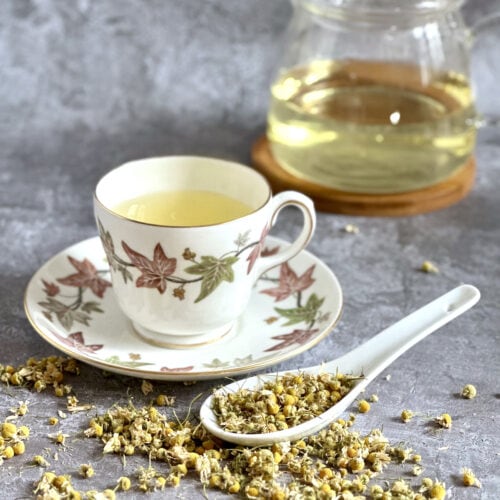
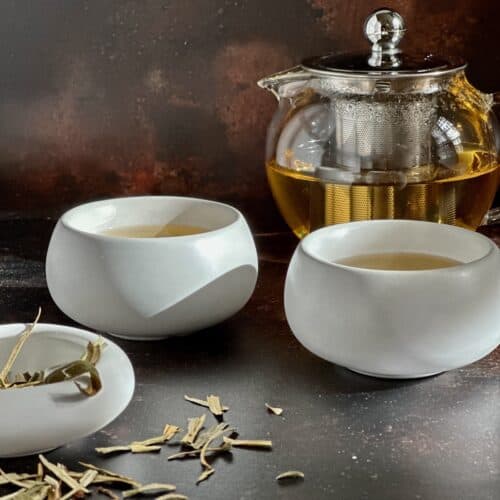
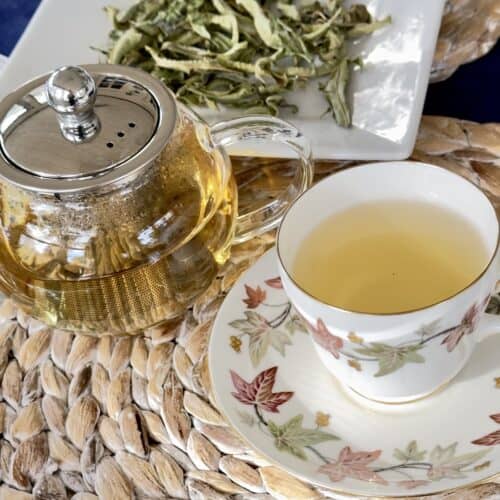
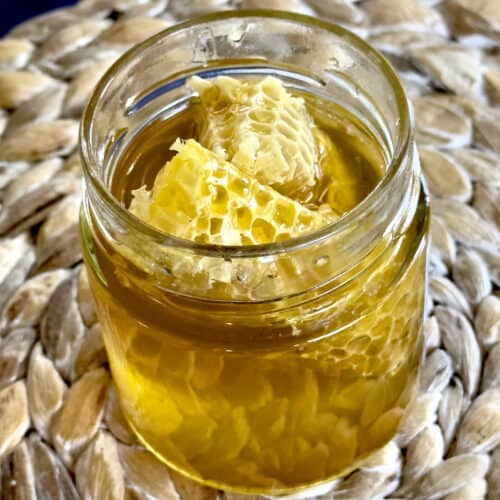
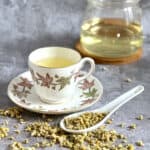
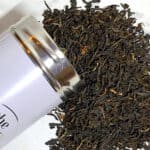
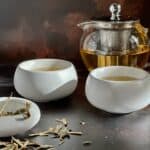
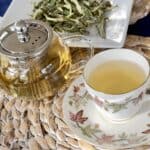


sue
My homeopathic doctor just gave me l-theanine capsules for anxiety. They work great, however he told me that l-theanine comes from tea and the best two were matcha and gyokuro teas from Japan. I would be concerned about ingesting anything from Japan because of the radiation factor from there. Comments? TU
Mary Ann Rollano
The short answer is if you purchase Japanese green tea from a reputable tea vendor, they are well aware of the concerns and screen their teas accordingly. Check your preferred vendor's website for information on screenings. The best matcha shops will post their quality standards and certification of radiation testing results. Most matcha comes from the Uji mountains in the Kyoto prefecture in central south Japan. Its mountainous area is far from the 2011 Fukushima site and is not a concern. Pique Matcha is sourced from the Kagoshima area which is even further south and they do post their screenings on their website. You can also check Japan's Ministry of Health for updates.
Ley Ann
I love tea, all kinds, and read all I can about it. I like to blend my own tea with other flavors. I like to learn the health benefits, where it grows and the differences in flavors of types of tea (like English breakfast tea vs Irish breakfast tea). I have learned a lot from your website. I would like to see your ebook, The Power of Tea, in actual print. Is there any chance of this happening? Thank you for the articles you post. I look forward to reading them.
Mary Ann Rollano
Thank you, Ley Ann, for your supportive words. Currently, my eBooks are available for download, and you can print them yourself. This is something new for Life Is Better With Tea publishing, and so in the future, a hard copy book may become available. It's not out of the realm of possibility, but for right now, hard copies are not available.
Linda Oliver
Mary Ann,I love black tea with the warming spices ,(cinnamon, nutmeg,ginger)does this make any difference in the amount of theanine you get from the tea and the effect that you get
Jean | Delightful Repast
Mary Ann, lovely article. I drink loose leaf black tea several times a day. (I don't like green tea.) Can't drink a single cup of coffee without horrible effects from the caffeine, but the caffeine in tea does not bother me at all.
Mary Ann Rollano
Thank you!
Hannes
"Shade grown green tea: Gyokuro and matcha may have as much as 46mg per cup. source"
I tried to check the source, however, there is no mention of Gyokuro in the paper.. Any guidance?
Tony Bowles
Lemon balm helps with anxiety, so mixing this with Gyokuro should have an enhanced effect.
Mary Ann Rollano
That's an interesting combination. It actually sounds quite good. I'll have to try it. Thanks for the tip!